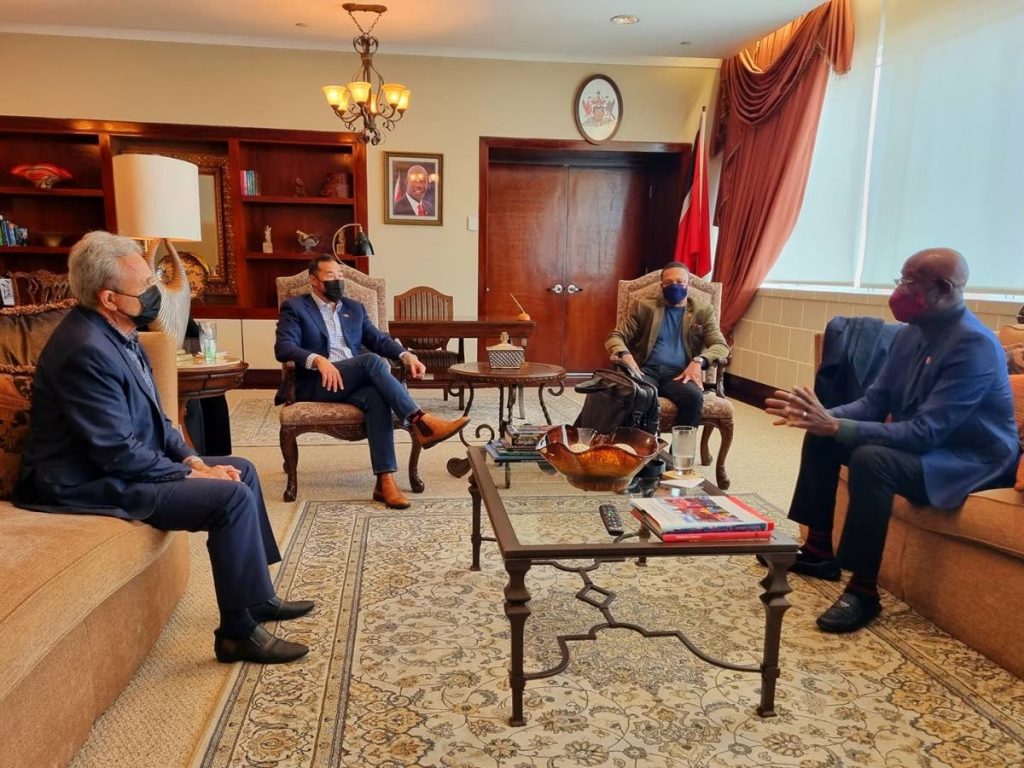Police commission crisis remains unsettled as PM jets off to Scotland

Former chairman of the Police Service Commission (PSC) Prof Ramesh Deosaran has described as an “unhappy coincidence,” the fact that the Prime Minister, Leader of Government Business and other key ministers are out of the country whilst the appointment of a substantive commission remains unresolved.
Dr Rowley, Planning Minister Camille Robinson-Regis, Energy Minister Stuart Young and Foreign Affairs and Caricom Minister Dr Amery Browne left the country on Saturday to attend the World Leaders Summit at the UN Climate Change Conference, COP 26, in Glasgow, Scotland. The conference begins on Sunday and is expected to end on November 12.
A statement from the Office of the Prime Minister on Saturday said Rowley, on completion of his meetings in Glasgow, is scheduled to meet with officials of energy companies BP and Shell in London, and is scheduled to return on November 6.
Their departure came the day after it was confirmed that President Paula-Mae Weekes had selected a fifth nominee, attorney Rajiv Persad, to the PSC. All five nominees for the commission have now been filled with Persad joining retired judge Judith Jones, criminologist Ian Ramdhanie, accountant Maxine Attong and management consultant Maxine King.
The Government now has to table the names of the nominees before the House of Representatives for approval.
The President, in keeping with the provisions of the Constitution, consulted with both the Prime Minister and Opposition Leader Kamla Persad-Bissessar before making the recommendations.
But Persad-Bissessar has already said she would not participate in the process until the President clears the air about the circumstances surrounding the collapse of the previous Bliss Seepersad-led PSC.
Deosaran said on Saturday that he thought the matter involving a new PSC was to be resolved expeditiously.
“It now appears an unhappy coincidence that the Government House Leader (Camille Robinson-Regis), the Prime Minister, the Energy Minister (Stuart Young) and Minister of Foreign Affairs (Dr Amery Browne) are absent from Parliament at this time because I thought the impression given to the national community was that this matter of having a PSC on board fully complemented and moving swiftly to appoint a police commissioner would have been done with the greatest hurry because of the unsettling circumstances around the resignation of the entire PSC and the controversies around the President as well,” he said.
Deosaran said while the climate change conference is important, “It is an unhappy coincidence that these government members, especially the Prime Minister and the House leader should be absent.”
“It means what the public sees as a crisis will continue.”
“It means that the country will have to wait for more than a week to get what is called a crisis, settled. I want to emphasise it is an unhappy coincidence because as important as climate change is and the attendance at the Glasgow conference is, it shows when we don’t have an appropriate system or administrative infrastructure to deal with such matters, it tells you how it could put us into deeper and deeper trouble.”
Deosaran, a criminologist, said the situation highlights the “complicated nature” of the commission’s functions.
“That complication has come now to haunt us because that matter should have been simplified so as to help prevent such unfortunate and unexpected disasters.”
He said the situation is aggravated by Persad-Bissessar’s concerns about what she calls the moral authority of the President to provide answers about the collapse of the previous PSC.
“That would take us into another level sooner than later because when these nominations come to Parliament there will be a set of blasts against the Government and also the President, so this thing is not going to finish right now. There will be much more heat than light eventually.”
Former PSC member, attorney Martin George, told Sunday Newsday the Opposition Leader does not have to respond favourably or otherwise to the President’s submissions.
“The President would have satisfied her duty of consultation by inviting a response from the Opposition Leader and from the Prime Minister,” he said.
“Even if their responses are yea, nay or indifferent, those responses are not necessarily determinative of the issue because at the end of the day, the President is free to accept a response or suggestion from them and she is also free to entirely ignore it. That still satisfies the constitutional requirement and duty of consultation in such circumstances.”
“Even if it’s the refusal to respond by the Opposition Leader, the duty of consultation has been fulfilled and the list can now be moved forward and tabled in the Parliament of Trinidad and Tobago where it is supposed to be debated upon and approved by majority vote.
“What that really means is that if it is that the Government has the majority then, in the normal course of things, one would imagine that whoever the Government wants as nominees, those are the persons who would end up being chosen.”
Attorney General Faris al-Rawi is said to be finalising an amendment to the Constitution to allow the the commission to appoint an acting CoP without the approval of the Parliament for specific periods, He did not respond to a query seeking comment on the status of the proposed legislation.
The amendment is necessary after the September 14 ruling by Justice Nadia Kangaloo which stated that under the current legislation any acting appointment by the commission for the positions of CoP or deputy commissioner of police had to be approved by Parliament.

Comments
"Police commission crisis remains unsettled as PM jets off to Scotland"